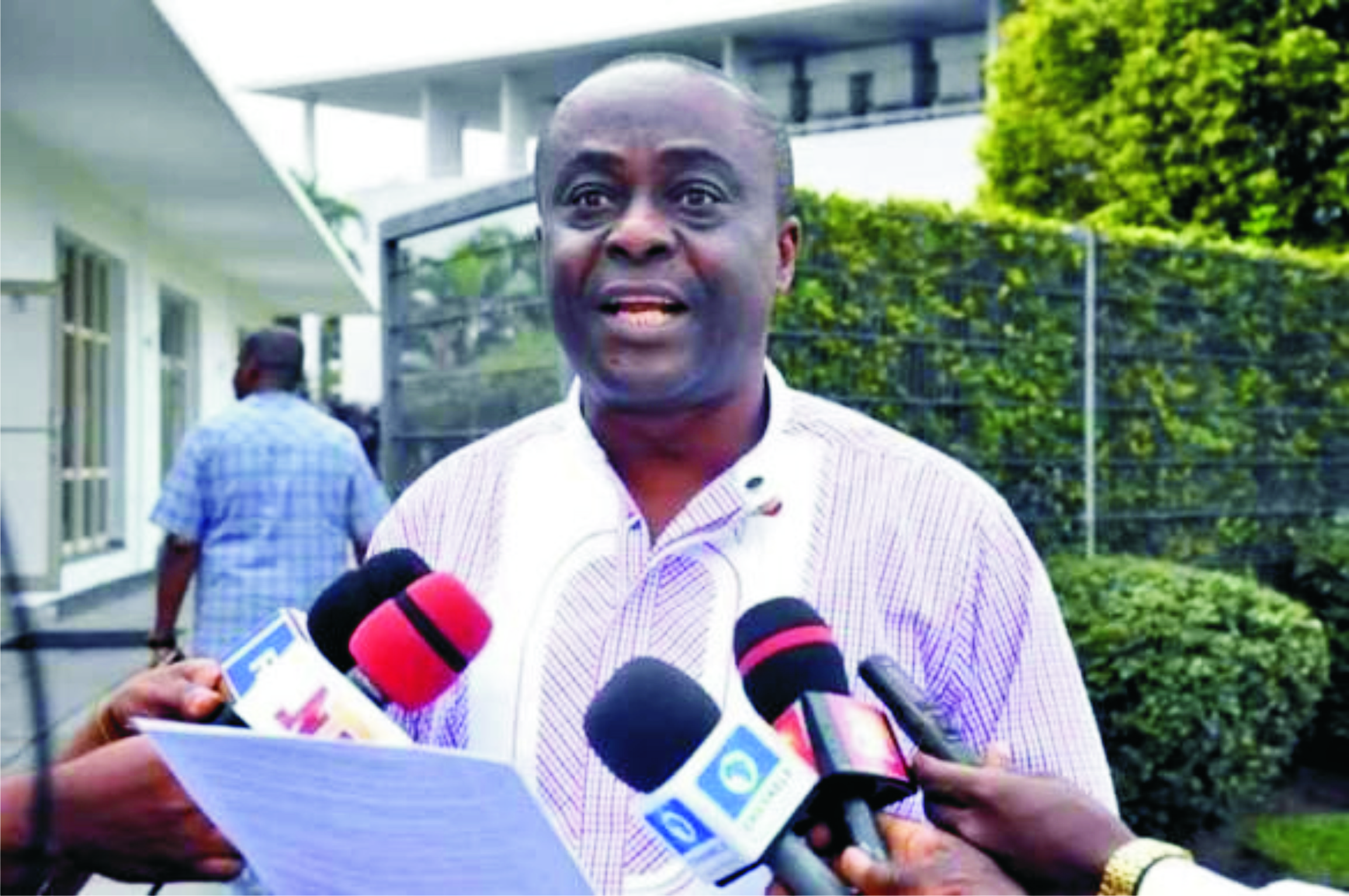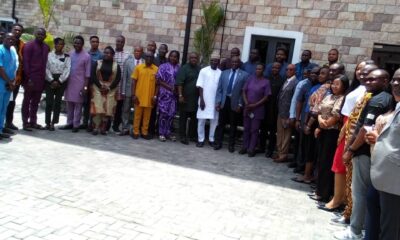News
Nsirim Reads Riot Act, Seeks Discipline, Creativity From Media

The Rivers State Commissioner for Information and Communications, Pastor Paulinus Nsirim has read the riot act to state-owned media houses, noting that discipline and creativity must be entrenched to contain competition and boost productivity.
Nsirim stated this while addressing the management and staff of the Rivers State Television (RSTV), Elelenwo in Obio/Akpor Local Government Area, yesterday, to begin his familiarization tour of parastatals under his ministry.
While commending the General Manager of RSTV, Mrs. Dafini Gogo-Abbey, management and staff for their efforts in publicizing government policies and programmes, he said more still needs to be done especially in the present circumstance.
He said, “I am convince that as Commissioner for Information we have the right professionals in the various departments of this organization who have the requisite training and experience to deliver on assignments. My job is to make you re-orientate yourselves, wake up every one that is sleeping and to say to us that we need to roll up our sleeves for more work.
“We are privileged at this time in the history of Rivers State that we have a Governor who is passionate to make Rivers State the destination of Choice. His Excellency in rebuilding infrastructure, paying attention to education, healthcare delivery, agriculture, manpower development is desirous to make Rivers State the destination of choice.
“And he is putting everything into ensuring that the NEW Rivers Vision Blueprint he enunciated when he took the oath of is four and half years ago is implemented to the letter. We have a Governor who does not speak from both sides of the mouth. What he says he will do, he will do.
“He has shown Rivers people that his second tenure will be like a first tenure. His Excellency wants Rivers State to be a pride of all of us and he has demonstrated that with his style of governance. Your role is to use Rivers State Television to key into that development agenda.
“To key into that development agenda, you must be professional, you must be dedicated, you need to do a lot of re-orientation and personal development. If we do that collectively, we will be making a mark.
“And I am proud to say that when we celebrated 100 days in office of the Governor this second tenure, we were one State of the federation that had projects to be commissioned and we did that for three weeks. His Excellency was on the road commissioning people oriented projects.
“With a man that has that kind of vision, those of us in the media parastatals have a critical role to play. Now that the 2020 Budget has been announced, what are you going to do as a media house to ensure that the people for whom the budget is meant for get what they are supposed to get?
The Commissioner said he expects that the media ought to do a sectoral analysis of the budget to help sell the programmes and policies of the incumbent administration which underscores the need to be proactive.
“We are in a new dawn that calls for creativity and innovation, “he stated, adding that workers welfare will be given priority but urged them to show that there professional in RSTV. We will not tolerate indiscipline. I had to hold a meeting with the management staff before this general meeting and I have empowered them.
“I have empowered the management to utilize disciplinary measures to ensure that those who think that this is a place where you can come and do anything you like, you earn salary and go stops. If you a member of staff here and you are part of those who are indiscipline, those who are not dedicated to their duties, then you are going to be in trouble because I have told the management to draw up an appraisal system for this organization.
“Because it a public communication outfit does not mean that we won’t make profit. It doesn’t mean that we can’t shine like other Television houses. The Television house is a platform for creativity. If any staff here (Rivers State Television) is creative, you will be sought after. The media house is a place you can stir up your potential and distinguish yourself if you are creative.
“The times now calls for personal development, saying he would like to see more creativity and healthy competition. Television is glamour right from the dressing of news casters to diction. You need to understand that this promotion that His Excellency gave to me is our collective promotion. I can’t thank him enough.
“If you understand that this is the first time in our Ministry where somebody will rise from the ranks, get to be Permanent Secretary and now Commissioner. You will understand that there is a reason for this appointment. And because it is so we can’t afford to let His Excellency down. We all need to redouble our efforts.
So I am going to demand from RSTV better programming, better content and I am going to demand from the news casters to dress with class. I am demanding professional competence from Rivers State Television,” noting that he expects to see changes immediately and urged them to show commitment and dedication with the little that is available to them.
“I have found out in my working career that what makes people stand out is when they are able to manage the little they have and show that they have potentials and then people will recognize them
“We must be proactive as media houses, the platform you have accommodates lots of creativity and hard work. The media house is a place you can stir up your potential and be creative. I want to see competition among those in programmes and other core areas and we will be ready to partner with the management of the station to honour those that are creative,” he added.
He explained that the promotion given him by His Excellency is a collective promotion urging everyone to roll up their sleeves for more work that would engender success in the Governor Wike led administration.
Dennis Naku & Susan Serekara-Nwikhana
News
Rivers @ 58: Stakeholders Task Govt On Infrastructure, Human Dev

As Rivers State celebrates the 58th anniversary of its creation today, some stakeholders have called on the State Government to do more towards improving the quality of infrastructure and human capital development in the State..
A cross section of stakeholders who spoke in an interview with The Tide also commended successive administrations in the state for their efforts towards expanding infrastructure network across the state.
They noted that more communities, both at the upland and riverine parts of the State, now have access to road network than when the stayte was created 58 years ago.
They, however, urged the government to return the state to the era of overseas scholarship when brilliant students are given opportunities to further their studies.
Speaking with The Tide, former youth leader of Chokota community in Etche Local Government Area, Mr. Ebere Nwankwo, said Rivers State has made progress in various fronts, despite the ongoing political crisis in the State.
Nwankwo noted that the State now has more tertiary institutions, both private and public, while the number of secondary schools have tripled.
He added that the State has also recorded tremendous progress in the area of healthcare.
According to him, healthcare has been brought closer to the doorstep of the common man, as there is hardly any local government in the state that doesn’t have a government health centre today.
The youth leader further said that many Rivers indigenes, home and abroad, have brought glory to the State in their various capacities, and urged the government to provide the enabling environment for the youths to excel.
Also speaking, the spokesperson for the International Peace Advocates, Mr. Emmanuel Nkweke, said the position of Rivers State among the comity of states in the country cannot be taken for granted.
He attributed this success to the efforts of successive administrations in repositioning the state for development.
Nkweke, however, called for a speedy resolution of the political impasse in the State to enable the State move to the next level of development.
Also speaking, a civil servant, Mrs. Ngozi Sunday, noted the efforts of government to improve the quality of lives of Rivers people, but called for a return to democratic governance in the State.
Another civil servant, Mrs. Munuonye Tina Ogechi, said Rivers State within the past 58 years has recorded significant achievements in road infrastructure, youth empowerment and repositioning of the state civil service for greater productivity.
She commended the suspended Governor of the State, Sir Similanayi Fubara, for taking the issue of women empowerment and peace seriously.
Meanwhile, a teacher, Mr. Orie Fiberesima, decried the high cost of living and lack of jobs in the State, and the need for a more effective government.
He also stressed the need for the government to look into the issue of high rent in Port Harcourt, noting that houses are now beyond the reach of the average Rivers man.
Mr. Innocent Chimobi, in his own view, urged the government to attract more industries and foreign investments to the State as a way of providing employment opportunities for the jobless youths in the State.
He also called the attention of the government to the terrible state of roads in some rural communities, advising the government to work hand in hand with the communities to foster better development.
By: John Bibor/Claire Julius
News
Minister Sets Up Team To Manage Emefiele-Linked Estate

The Minister of Housing and Urban Development, Ahmed Dangiwa, yesterday, unveiled a 12-member ministerial committee to oversee the 753-unit recovered housing estate linked to former Central Bank of Nigeria Governor, Godwin Emefiele.
The estate was recently handed over to the Ministry by the Economic and Financial Crimes Commission, following a directive from President Bola Ahmed Tinubu.
In a statement released yesterday, Dangiwa emphasised the critical nature of the assignment, describing it as a key step towards realising the housing component of the Renewed Hope Agenda.
The statement read, “Housing and Urban Development Minister, Ahmed Dangiwa, has inaugurated a twelve-member ministerial committee on the 753-unit recovered housing estate located in the Lokogoma district, Abuja, FCT.”
He reiterated that the committee’s mandate aligns with the President’s vision and the Ministry’s reform objectives to transform the estate into liveable, secure, and affordable homes for Nigerians.
“The committee was constituted based on the vision of Mr President and the Ministry’s housing reform drive to ensure that the recovered property is swiftly transformed into liveable, secure, and affordable homes for the benefit of Nigerians,” he said.
Dangiwa underscored the importance of technical expertise and institutional integrity in executing the assignment, noting that committee members were selected from key departments within the Ministry.
“Your selection is a testament to the confidence the Ministry has in your ability to drive this initiative with the seriousness and efficiency it demands.
“Nigerians are watching and expect results. They want to see homes completed and allocated transparently. They want to see the government working for them,” Dangiwa emphasised, urging committee members to collaborate effectively and remove unnecessary bottlenecks.
He charged them to adopt a fresh mindset, stating, “Think outside the box. Be results-oriented.”
The committee is chaired by the Ministry’s Permanent Secretary, Shuaib Belgore, and includes senior directors and aides from the technical, financial, engineering, planning, procurement, and media departments.
The committee’s Terms of Reference include conducting a thorough structural and integrity assessment of the buildings, determining the number and condition of housing units, and valuing existing work through proper surveying and market evaluation.
Additionally, the committee will assess costs required to complete essential infrastructure such as roads, power, and water. It will also develop standards for architectural and finishing consistency, propose a fair and transparent strategy for disposal and allocation of units via the Renewed Hope Housing Portal, and devise a public engagement plan to build confidence.
The committee must ensure effective coordination with key stakeholders, including the EFCC, FCTA, and relevant utility providers. A preliminary report is expected within four weeks.
The Minister of State, Yusuf Ata, emphasised the need for the committee to co-opt additional professionals as required, given the scale of the task and tight deadline.
“The committee should have the authority to co-opt members to assist, considering the magnitude of the task and the four-week timeline,” he noted.
Belgore assured that the team would execute its duties diligently and professionally.
“The committee has been tasked with ensuring the recovered estate undergoes a comprehensive technical assessment, is strategically completed, and disposed of transparently and cost-effectively, in line with national housing delivery objectives,” he said.
He added that the success of the assignment would serve as a model for transforming recovered public assets into impactful infrastructure.
“The successful execution of this assignment will serve as a benchmark for converting recovered public assets into infrastructure that directly benefits the people,” he concluded.
News
Hajj 2025: Saudi Arabia Deports Gumi

Renowned Islamic scholar, Sheikh Ahmad Gumi, has been deported from Saudi Arabia after being denied entry into Medina, effectively barring him from participating in the 2025 Hajj pilgrimage.
Gumi, a Kaduna-based cleric, known for his controversial views on national and international issues, confirmed the development in a statement posted on his official Facebook page, yesterday.
“Due to some reasons related to my views on world politics, the authorities in Saudi Arabia do not want me to be present at Hajj even though they have granted me a visa,” Gumi wrote.
The cleric, who was part of a delegation of religious scholars sponsored by the National Hajj Commission of Nigeria (NAHCON), arrived at Prince Mohammad Bin Abdulaziz International Airport in Medina on Saturday night via Umza Air.
However, upon arrival, Saudi immigration officials reportedly stopped him at the airport and denied him entry into the city, before placing him on a return flight to Nigeria.
Sheikh Gumi added in a statement on his page that the Nigerian authorities have shown concern and have promised to engage Saudi officials to seek clarification and resolution.
“I am grateful to the authorities in Nigeria who have pledged to engage with the Saudi authorities on this matter,” he said.
Although no official reason has been provided by Saudi Arabia for the deportation, observers believe the action may be connected to Sheikh Gumi’s outspoken political and religious views, which may be at variance with the kingdom’s policies.
Gumi has, in recent years, played a prominent role in dialogue initiatives with armed groups in Nigeria’s northern region and has often voiced criticism of Western and Middle Eastern political interventions.
The incident has sparked discussions among religious communities and the wider public, with many questioning the implications of political ideology on religious observance.
As of the time of filing this report, there is no official statement from the Saudi embassy or the Nigeria’s Ministry of Foreign Affairs on the development.
Sheikh Gumi has since resumed his public preaching and teaching engagements in the country.
-

 News2 days ago
News2 days agoTinubu to attend ECOWAS’s 5Oth anniversary, inaugurate projects in Lagos
-
Niger Delta2 days ago
C’River Unveils Sustainable Environment, Natural Management Policy
-

 Oil & Energy2 days ago
Oil & Energy2 days agoTap Into Offshore Oil, Gas Opportunities, SNEPCO Urges Companies
-

 Niger Delta1 day ago
Niger Delta1 day agoHYPREP Solicits Regulators, Asset Owners’ Support
-
Rivers2 days ago
Don Advocates ‘Okanaa’ Theory For Ecological Survival
-

 News2 days ago
News2 days agoIbas Calls For Prosecution Of Oil Thieves
-
Niger Delta2 days ago
Gunmen Kill Woman, Abduct Husband In Edo
-

 Oil & Energy2 days ago
Oil & Energy2 days agoNigeria Loses More Crude Oil Than Some OPEC Members – Nwoko

